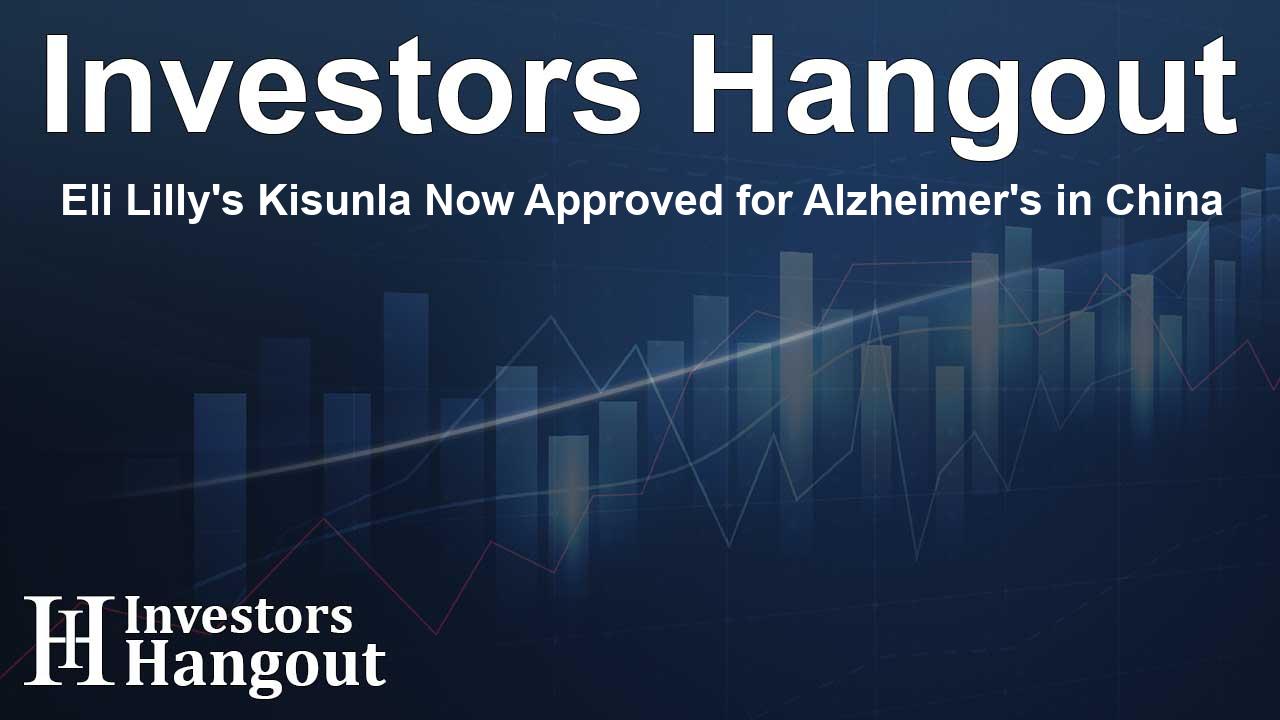Eli Lilly's Kisunla Now Approved for Alzheimer's in China

Eli Lilly's Innovative Alzheimer's Treatment Receives Approval
In a significant development for Alzheimer's patients, Eli Lilly's treatment, known as Kisunla, has recently received approval from China's medical regulatory authorities. This marks an important milestone, as it provides another therapeutic option for individuals battling early stages of this challenging disease. The approval follows the earlier success of Eisai and Biogen's drug, Leqembi, adding to the growing list of treatments available for Alzheimer's care.
Expanding Market Availability
With this decision, China joins three other major markets, including the United States, Japan, and the UK, where Kisunla has also been approved for use. Eli Lilly’s announcement has been met with enthusiasm as it opens new doors for patients and healthcare providers in the fight against Alzheimer's Disease.
Mechanism of Action
Similar to Leqembi, Kisunla works by targeting and decreasing the levels of beta-amyloid, a protein that accumulates in the brains of Alzheimer's patients. This mechanism is crucial as removing these plaques may help slow cognitive decline and improve quality of life.
Study Results Highlight Efficacy
Data from a recent late-stage clinical trial demonstrated that Kisunla can effectively slow the progression of memory and thinking issues by approximately 29% compared to a placebo. While the treatment shows promise, it is important to note that it has also been associated with some serious side effects. Nearly 25% of participants in the trial experienced brain swelling, with around one-third reporting brain bleeding. Nonetheless, these side effects were primarily mild.
Safety Considerations and Dosing
Kisunla is incorporated into the United States' Drug Administration’s strongest safety warning regarding potential adverse effects related to brain swelling and bleeding. However, Eli Lilly is taking proactive measures; by starting patients on a more gradual dosing schedule, they have successfully reduced the occurrence of severe brain swelling.
Finite Dosing Advantage
A distinctive feature of Kisunla, unlike other treatments such as Leqembi, is its finite dosing schedule. This means that patients can discontinue treatment once brain scans indicate that amyloid plaques are no longer present, offering a more tailored approach to Alzheimer’s care.
The Bigger Picture of Alzheimer's Care
Alzheimer's disease stands as one of the leading causes of dementia, representing around 60%-70% of all dementia cases globally, as identified by the World Health Organization (WHO). With rising diagnoses, effective treatments are more crucial than ever, which highlights the importance of Kisunla’s approval in enhancing patient outcomes.
As awareness about Alzheimer's continues to grow, so does the need for options that can meaningfully alter the disease's progression. Kisunla's arrival on the market reflects progress in pharmaceutical advancements and the ongoing commitment to understanding and treating this complex condition.
Frequently Asked Questions
What is Kisunla and how does it work?
Kisunla is Eli Lilly's treatment for early Alzheimer's that aims to reduce levels of beta-amyloid, a protein associated with the disease, helping to slow cognitive decline.
What are some side effects of Kisunla?
Side effects may include brain swelling and bleeding, though many cases are mild. Starting with a gradual dosing schedule may help minimize these risks.
In which countries is Kisunla approved?
Kisunla has received approval in four major markets: the United States, Japan, the UK, and China.
What is the significance of finite dosing?
Finite dosing allows patients to stop treatment once scans show no amyloid plaques, potentially reducing long-term medication dependence.
Why is Alzheimer's treatment important?
Alzheimer's is the leading cause of dementia, and effective treatments are essential to improving the quality of life for those affected by the disease.
About Investors Hangout
Investors Hangout is a leading online stock forum for financial discussion and learning, offering a wide range of free tools and resources. It draws in traders of all levels, who exchange market knowledge, investigate trading tactics, and keep an eye on industry developments in real time. Featuring financial articles, stock message boards, quotes, charts, company profiles, and live news updates. Through cooperative learning and a wealth of informational resources, it helps users from novices creating their first portfolios to experts honing their techniques. Join Investors Hangout today: https://investorshangout.com/
Disclaimer: The content of this article is solely for general informational purposes only; it does not represent legal, financial, or investment advice. Investors Hangout does not offer financial advice; the author is not a licensed financial advisor. Consult a qualified advisor before making any financial or investment decisions based on this article. The author's interpretation of publicly available data shapes the opinions presented here; as a result, they should not be taken as advice to purchase, sell, or hold any securities mentioned or any other investments. The author does not guarantee the accuracy, completeness, or timeliness of any material, providing it "as is." Information and market conditions may change; past performance is not indicative of future outcomes. If any of the material offered here is inaccurate, please contact us for corrections.